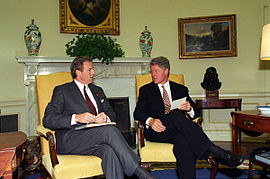Jim Guy Tucker
James Guy Tucker Jr. (born June 13, 1943) is an American former politician, businessman, and attorney who served as the 43rd governor of Arkansas from 1992 until his resignation in 1996 after his conviction for fraud during the Whitewater affair.[2] He had his first taste of politics when he ran for and was elected vice-president of Key Club International (the largest and oldest high school service organization in the United States).In early 1965, Tucker found passage to southeast Asia by tramp steamer from San Francisco and entered South Vietnam as an accredited freelance war correspondent.Twelve "guest" judges were temporarily reassigned from other circuits by the state supreme court at Tucker's request to clear the docket.However, the following year, a federal grand jury, building on Tucker's work, issued a scathing report which led to a shake-up of the department and the resignation of the chief, senior detectives and complicit city officials.He easily defeated the Republican nominee Edwin Bethune, then of Searcy in White County, and later Tucker's successor as U.S. Representative from the Little Rock–based Arkansas's 2nd congressional district.Tucker also began intervening in utility rate cases before the Arkansas Public Service Commission and fought to require "scrubbers" on a large coal-fired generation plant.In 1979, President Jimmy Carter appointed Tucker the chairman of the White House Conference on Families, in which capacity he served until the end of the administration in January 1981.[5] Tucker called a special session of the General Assembly that same week to solve a financial crisis for the state's Medicaid system.[8] Beginning in the early 1980s, while practicing law, Tucker and his wife Betty began building cable television and pay per view systems in Central Arkansas, and later in the Dallas–Fort Worth corridor north of DFW Airport and in southern Florida.Tucker traveled to Indonesia in January 1999 and with the Riady family created a new company called Kabelvision, and built and expanded systems in greater Jakarta ('Jabotabek'), in Surabaya, and in Bali.
Congressional Pictorial DirectoryGovernor of ArkansasBill ClintonMike HuckabeeLieutenant Governor of ArkansasWinston BryantU.S. House of RepresentativesArkansasWilbur MillsEd BethuneAttorney General of ArkansasDale BumpersDavid PryorRay ThorntonProsecuting AttorneyOklahoma City, OklahomaDemocraticLittle Rock, ArkansasHarvard UniversityUniversity of ArkansasMarine Corps ReserveCandidateOfficer Candidates SchoolconvictionWhitewater affairDemocratic Partylieutenant governorstate attorney generalU.S. representativeOklahoma CityLittle RockHall High SchoolKey Club InternationalUnited States Marine Corps ReserveulcersCamp UpshurMarine Corps Base QuanticoQuantico, Virginiatramp steamerSouth Vietnamwar correspondentassistant professorAmerican historyAmerican University of BeirutUniversity of Arkansas Law Schooladmitted to the barRose Law Firmprosecutorfelonykidnappingstate supreme courtCriminal Codepolice corruptiongrand jurychief of policeWhite House1972 Democratic National ConventionRepublicanEdwin BethuneSearcyWhite CountyArkansas's 2nd congressional districtUnited States SenateJimmy CarterFrank WhiteRicky Ray RectorSheffield Nelsonmail fraudKenneth StarrWhitewater scandalJames B. McDougalSusan McDougalRobert "Say" McIntoshimpeachmentJames RiadyIndonesiagastrointestinalliver transplantMayo ClinicRochester, MinnesotaColumbaInternational Star RegistryList of governors of ArkansasBiographical Directory of the United States CongressWayback MachineC-SPANU.S. House of RepresentativesU.S. order of precedenceMartha McSallyOrder of precedence of the United StatesMike ParsonGovernors of ArkansasTerritorialJ. MillerFultonJ. ConwayE. ConwayRectorFletcherFlanaginMurphyClaytonHadleyBaxterGarlandW. MillerChurchillHughesFishbackClarkeLittlePindallMartinDonagheyRobinsonOldhamFutrellBroughTerralMartineauParnellBaileyAdkinsMcMathCherryFaubus